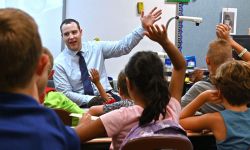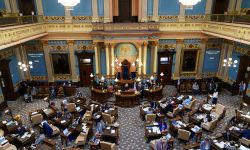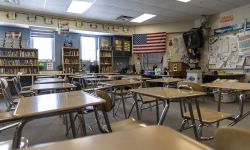Many leadership positions at risk in Detroit schools as COVID-19 relief dries up

Funds for school deans, assistant principals, central office staff, and summer school programs are at risk of being cut as Detroit school district officials consider how to balance their budget when federal COVID-19 relief money dries up.
That’s the outlook for the district based on priorities that Superintendent Nikolai Vitti outlined during a school board finance committee meeting Friday morning. The priorities reflected discussions the full board held during an hours-long, closed-door meeting on Feb. 18.
“Based on the board retreat, the priorities moving forward with available funds are contracted nurses, full time social workers, and academic interventionists,” Vitti said Friday.
Related:
- Should Michigan schools teach cursive? Some say yes.
- Michigan preschool expansion hits a snag as some providers face funding cuts
- Federal COVID relief aid to schools will dry up soon. Are districts ready?
The Detroit Public Schools Community District received a total $1.3 billion in federal aid that was designed to help students recover from the pandemic. The loss of that funding will hit the district hard, because one of its main remaining sources of revenue is state aid based on enrollment. And DPSCD has seen its enrollment drop by about 2,000 students since the start of the public health crisis.
DPSCD will have spent most of the federal money by the end of this school year on initiatives such placing nurses in every school, increasing mental health resources and staff support, creating and expanding the DPSCD Virtual School, and after-school and summer school programming. And it has already committed $700 million to renovate and rebuild schools across the city.
As many as 100 staff members have already been told their positions, paid for in part using federal COVID aid, may be cut or consolidated by the end of the school year.
After this year, the funding cuts will hit “school based administrators, deans, assistant principals and central office administrators,” Vitti said. However, he noted that individual principals could tap their discretionary budgets to cover some of these positions.
Lakia Wilson-Lumpkins, president of the Detroit Federation of Teachers, said the effects of dwindling COVID-19 relief dollars will come up in contract negotiations for all of the unions connected to the district.
“As we build momentum in our contract talks, we understand that there will be some shifts made due to the loss of COVID funding,” Wilson-Lumpkins said. “Our concern as the union is how to maintain all of our members, because the services are still needed.”
“We don’t want to put our members, and our students most importantly, in a situation where there have been deep cuts unnecessarily or prematurely,” she said.
Parent liaisons should be here to stay
Detroit schools will have access to federal funding through Title I, a program that provides additional money for schools with high numbers or high percentages of low-income students.
Vitti said individual schools will have to rely on Title I dollars to fund parent liaison positions next school year.
Parent liaisons, or parent outreach coordinators, have been key to the district’s efforts to connect with and engage parents and families across the city. Hired as part-time staff, these parents typically work with school staff to run parent programs and workshops, promote school-sponsored events, advertise parent-teacher conferences, and coordinate home visits for administrators.
During the pandemic, the district used some of its COVID-19 dollars to pay district staff and parents to canvas neighborhoods as it prepared to return fully to in-person learning in the 2021-22 school year.
“There’ll be some dollars” for the neighborhood canvassing, Vitti said, “but not as much when we think about one-time COVID money. But the parent liaisons will be funded in individual schools.”
Detroit’s robust summer school may see drastic cuts
The Detroit district’s ambitious summer school offerings will likely see drastic reductions going into the summer. Vitti said the district intends to limit its program to students in grades 8 through 12 who need to complete credit recovery courses for core subjects such as English, math, science and social studies.
Over the past two years, DPSCD’s Summer Learning Experiences has offered a wide range of programs, from academic enrichment classes and STEM courses to recreational activities for students, funded with COVID-19 relief aid.
DPSCD spent $10 million to expand Summer Learning Experiences in 2021 and $11 million to expand the program this past summer, bringing summer school enrollment to roughly 8,000 students. The program was recognized last year by U.S. Education Secretary Miguel Cardona and first lady Jill Biden during a special visit at Detroit’s Schulze Academy for Technology and Arts.
This year, Vitti said, the district plans to offer summer school at five city high schools, and provide transportation. Individual high schools may offer bridge programs for eighth graders transitioning into ninth grade, but funding for those initiatives will have to come from individual school budgets.
Academic intervention reform remains a budget priority
The district has counted on academic interventionists for its larger reform efforts to provide intensive academic support for students performing below grade level in core subjects. Funding for these educators won’t go away.
Last fall, the district received a $20 million private donation from billionaire MacKenzie Scott. At the time, Vitti said the district planned to use that money to hire academic interventionists, and on Friday he said the district hopes to employ as many as 50 academic interventionists to work one-on-one or in small groups with students.
Those positions, according to Vitti, would primarily be located at specific K-8 schools that are large and “have more students … below grade level.”
Schools outside of those parameters, such as smaller K-5 and K-8 schools, will see a slight increase in their academic interventionist budget allocation. The overall number of academic interventionists at each of those schools, Vitti added, will depend on how many students are in each grade.
Michigan Education Watch
Michigan Education Watch is made possible by generous financial support from:
Subscribe to Michigan Education Watch
See what new members are saying about why they donated to Bridge Michigan:
- “In order for this information to be accurate and unbiased it must be underwritten by its readers, not by special interests.” - Larry S.
- “Not many other media sources report on the topics Bridge does.” - Susan B.
- “Your journalism is outstanding and rare these days.” - Mark S.
If you want to ensure the future of nonpartisan, nonprofit Michigan journalism, please become a member today. You, too, will be asked why you donated and maybe we'll feature your quote next time!






